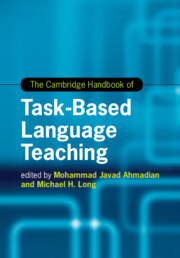Book contents
- The Cambridge Handbook of Task-Based Language Teaching
- Cambridge Handbooks In Language And Linguistics
- The Cambridge Handbook of Task-Based Language Teaching
- Copyright page
- Dedication
- Contents
- Figures
- Tables
- Contributors
- Preface The Origins and Growth of Task-Based Language Teaching
- Part I The Rationale for Task-Based Language Teaching
- Part II Tasks and Needs Analysis
- Part III The Task Syllabus and Materials
- 6 The Cognition Hypothesis, the Triadic Componential Framework and the SSARC Model
- 7 From Needs Analysis to Task Selection, Design, and Sequencing
- 7A Task-Based Telecollaborative Exchanges between US and Italian Students
- 8 Exploring the Nuts and Bolts of Task Design
- 8A Designing Pedagogic Tasks for Refugees Learning English to Enter Universities in the Netherlands
- Part IV Methodology and Pedagogy
- Part V Task-Based Language Teaching with School-Age Children
- Part VI The Teacher in Task-Based Language Teaching
- Part VII Task-Based Assessment and Program Evaluation
- Part VIII Research Needs and Future Prospects
- Index
- References
6 - The Cognition Hypothesis, the Triadic Componential Framework and the SSARC Model
An Instructional Design Theory of Pedagogic Task Sequencing
from Part III - The Task Syllabus and Materials
Published online by Cambridge University Press: 19 November 2021
- The Cambridge Handbook of Task-Based Language Teaching
- Cambridge Handbooks In Language And Linguistics
- The Cambridge Handbook of Task-Based Language Teaching
- Copyright page
- Dedication
- Contents
- Figures
- Tables
- Contributors
- Preface The Origins and Growth of Task-Based Language Teaching
- Part I The Rationale for Task-Based Language Teaching
- Part II Tasks and Needs Analysis
- Part III The Task Syllabus and Materials
- 6 The Cognition Hypothesis, the Triadic Componential Framework and the SSARC Model
- 7 From Needs Analysis to Task Selection, Design, and Sequencing
- 7A Task-Based Telecollaborative Exchanges between US and Italian Students
- 8 Exploring the Nuts and Bolts of Task Design
- 8A Designing Pedagogic Tasks for Refugees Learning English to Enter Universities in the Netherlands
- Part IV Methodology and Pedagogy
- Part V Task-Based Language Teaching with School-Age Children
- Part VI The Teacher in Task-Based Language Teaching
- Part VII Task-Based Assessment and Program Evaluation
- Part VIII Research Needs and Future Prospects
- Index
- References
Summary
Operationalizing a theory of task-based learning requires a specification of the features of task design that can be manipulated and sequenced during the time-course of instructional language learning programs to promote both performance success (measured in terms of the degree to which tasks can be accomplished in the second language), as well as progress in second language development (measured in terms of progress learners make in the increasing accuracy, complexity and fluency of their language production and comprehension). This chapter describes a theoretically motivated framework for pedagogic task design and sequencing which is currently being implemented and researched to assess the extent to which it facilitates target task success and language development for learners performing sequences of pedagogic tasks following the design criteria it proposes.
- Type
- Chapter
- Information
- The Cambridge Handbook of Task-Based Language Teaching , pp. 205 - 225Publisher: Cambridge University PressPrint publication year: 2021
References
Further Reading
References
- 5
- Cited by

